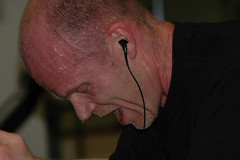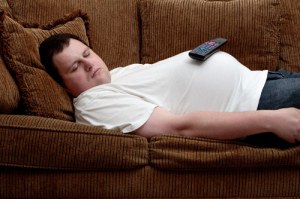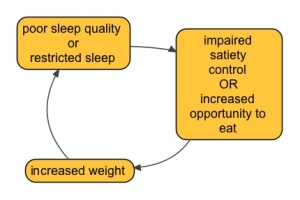Poor sleep can decrease satiety hormone levels,
leading to poor appetite control…
I’ve previously mentioned that only around 100 calories less are expended during sleep, compared with resting. Does that mean that you are more likely to get fat if you sleep rather than rest while maintaining the same calorie intake? The answer is not simple. The obesity epidemic in the U.S. has been connected with less sleep. It seems that Americans are getting roughly two hours less sleep a night than they were 40 years ago. I used to say (albeit flippantly) that if you sleep two hours less per night, that gives you two hours more to eat per day, and chances are those calories are going to be comfort calories! However, the relationships between sleep, stress, satiety and appetite hormones are actually very complex. Today I just want to explore this issue via the link between obstructive sleep apnoea (not breathing properly or stopping breathing momentarily during sleep) and obesity. Sleep apnoea is often associated with obesity, and although obesity (particularly a fat neck) can impact on breathing, it also seems that the interrupted sleep (caused by trying a get breath) can decrease satiety hormone levels. So a vicious cycle can develop – poor sleep caused by poor breathing leads to poor appetite control, which leads to increased weight, which further leads to poor sleep, etc, etc. Equally, it seems that restricting the amount of time one sleeps per night (obese or not obese) similarly reduces satiety hormone levels and, consequently, appetite control!
Do you rely on an alarm clock?
That takes me back to a question I raised earlier – do you need an alarm clock to wake you up every day? If the answer’s yes, then you’re probably not gettting enough sleep; or your biological clock is set to the wrong time; or your sleep is not sufficiently restful. Whatever the cause – maybe you shouldn’t eat a big breakfast as your appetite control may be diminished!








I seem to struggle to get up in the morning when my partner is around. What’s that about? Does increased temperature reduce the quality of sleep or something?
Well, it depends what you and your partner get up to and how the temperature is raised. But, in general, that’s correct, increased body temperature is associated with poorer sleep quality. Insomniacs tend to run slightly higher temperatures and most sleeping pills, melatonin, etc reduce body temperature.